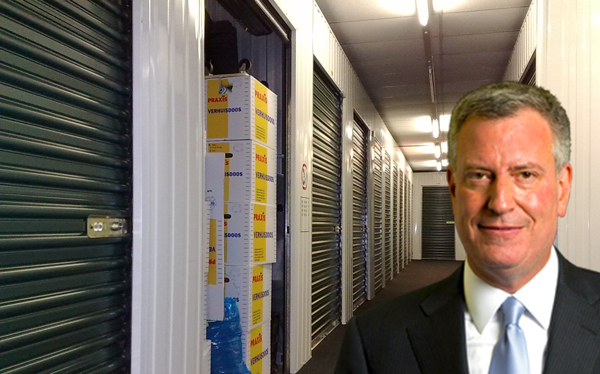The de Blasio administration is finally moving forward with a proposal it announced 18 months ago to seriously curtail the city’s emerging self-storage industry as part of City Hall’s plan to preserve middle-class jobs by regulating development in certain manufacturing zones.
City Hall this week introduced a land use application that would require new self-storage facilities to acquire special permits in certain parts of manufacturing districts in the outer boroughs, a move largely seen as tantamount to a ban on the business, which is acutely undersupplied in the five boroughs.
Mayor Bill de Blasio first brought the subject up in November 2015, when he laid out a 10-point plan to preserve manufacturing jobs in the city. (Another part of that proposal, a requirement for special permits for hotels that has the backing of the powerful hotel trades union, has not yet been introduced.)
As City Hall fine-tuned its proposal in March, planners considered alternatives such as allowing self-storage as parts of mixed-use developments with manufacturing uses. The alternative is not included in the city’s current application, but self-storage supporter are planning on pushing for its inclusion through the public review process.
“They’re now looking at how to create mixed-use developments that would include self-storage and manufacturing space,” said Michael Woloz, a lobbyist with the firm Connelly McLaughlin & Woloz who is working on behalf of a Bronx-based self-storage company to push back against the proposal.
“There are things that they’ve looked at that could represent some compromise positions,” he added. “What’s old is that City Planning itself admitted that such a text amendment would increase rates for existing self-storage and impact the amount of self storage in [industrial business zones].”
Opponents of the self-storage industry argue that the businesses provide only a few, low-paying jobs and take up valuable real estate that could otherwise be used for manufacturing. Supporters take the position that self-storage has stepped in only after manufacturing jobs have left the city for various other reasons, and that many small businesses rely on self-storage as a low-cost warehousing option.
In recent months the New York Self Storage Association and chambers of commerce in the Bronx, Brooklyn and Queens have come out against de Blasio’s proposal, and opposition is brewing among members of the City Council.
The City Council delegation from the Bronx, where many self-storage businesses are located, has mixed views on the industry, but regardless all eight members of the delegation have asked City Hall to hit the pause button on its zoning amendment.
Along with Borough President Ruben Diaz Jr., the delegation wrote a letter to the Department of City Planning last week saying they hadn’t been properly consulted when the city was drafting its proposal.
“To be clear, the Bronx Delegation is hardly a monolith on the subject of self-storage,” the letter read. “Some members of the delegation see self-storage as affordable warehousing for individuals and small businesses of minimal means. Others see it as a blight on waterfront properties and a competitor with manufacturing. Even though our views might vary from member to member, the delegation stands united in calling for a new beginning.”
For now, the political debate over self-storage seems to have shifted from manufacturing jobs to focus on the industry’s customers. Self-storage’s boosters say that facilities largely serve local residential residents without large homes and small businesses such as landscapers.
The political fight may boil down to who uses self-storage facilities. Supporters say that a large portion of self-storage customers are small businesses. But detractors are painting an image of Manhattan yuppies renting space in the boroughs to store skis and relief from their bulging closets.
In April, Diaz Jr. and Forest Hills Council Member Karen Koslowitz announced they planned to introduce legislation that would require self-storage facilities to report customers’ zip codes to the city in order to “provide a window into the universe of customers these facilities serve.”
Should de Blasio’s measure pass, it would squeeze new supply in an already extremely tight market. The New York metro area has 3.5 square feet of self-storage per person, compared to the nationwide average of 7.2 square feet, making it the most under-served market in the country, according to a report CBRE released last year.
